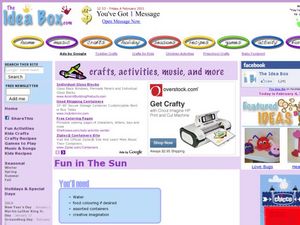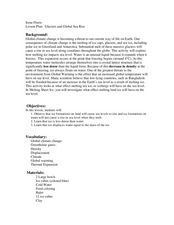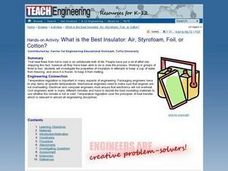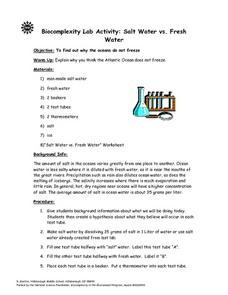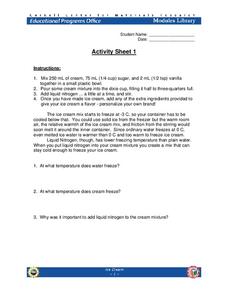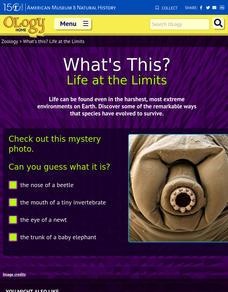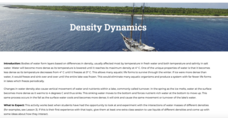Curated OER
Fun in the Sun
Students freeze colored water. In this art lesson, students take the blocks of ice out of the freezer, put the blocks into a small pool and watch the ice melt.
Science Geek
Thermochemical Calculations
Viewers learn where the heat goes when phase changes take place with a presentation that explains the latent heat of phase changes, or, more specifically, the molar heat of fusion, solidification, vaporization, and condensation. The show...
Center for Learning in Action
Water—Changing States (Part 1)
Here is part one of a two-part lesson in which scholars investigate the changing states of water—liquid, solid, and gas. With grand conversation and up to three demonstrations, learners make predictions about what they think will happen...
Center for Learning in Action
Water – Changing States (Part 2)
Here is part two of a two-part lesson in which scholars investigate the changing states of water—liquid, solid, and gas—and how energy from heat changes its molecules. With grand conversation, two demonstrations, and one hands-on...
Curated OER
Glaciers and Global Sea Rise
Students explain how melting glaciers affect global warming. In this earth science lesson, students investigate the change in ice density as it melts. They discuss the human and environmental impact of rising sea levels.
Curated OER
What is the Best Insulator: Air, Styrofoam, Foil, or Cotton?
Students investigate the properties of insulators by attempting to keep a cup of water from freezing, and once it is frozen, to keep it from melting. They conduct the experiment, record and analyze the results, and answer discussion...
Curated OER
Salt Water vs. Fresh Water
Students explore why the oceans do not freeze. They explain why they think the Atlantic Ocean does not freeze. Students are given background information about what they are doing. They create a hypothesis about what they believe...
Curated OER
State Change
Eighth graders explore the physical change of matter. As a class, they discuss their favorite super hero and determine if the hero undergoes a physical or chemical change. Students examine the change of state and phase change. In groups,...
Curated OER
It's The States of Matter
Students investigate the properties of solids, liquids and gases. For this states of matter lesson plan, students observe dry ice and its characteristics. They calculate the density of dry ice and observe the sublimation of the dry ice...
Curated OER
Understanding Oceans
Students investigate how ocean currents affect our world. For this ocean currents lesson, students perform an experiment to show how cold water is near the poles and warm water is near the equator. Students use water, food coloring,...
Curated OER
Physical Changes and States of Matter
Fourth graders study evaporation and condensation as parts of the water cycle. First they determine the similarities and differences between a cup of water and an ice cube before measuring the volume of ice before melting it, and...
Curated OER
States of Matter
Students explore the states of water. In this physical science instructional activity, students use ice and dry ice to observe the changes in the state of matter. Students record the results.
Curated OER
Rain Formation
First graders investigate the different water formations by conducting an experiment. In this water properties lesson, 1st graders examine jars filled with ice, rain water, air and snow in their class. Students predict what...
Curated OER
Forms of Water
Learners experiment to show the three forms of water. They watch a "hand" made of ice as it melts observing and drawing what they see.
Cornell University
Isotopes
What better way is there to learn about isotopes than to play with them? Chemistry students manipulate the number of protons and neutrons in a hands-on activity. Individuals try to score the largest number of points...
Curated OER
Frozen Solids
Students investigate various properties of ice including melting points and the effect of pressure on ice. They demonstrate how increased pressure lowers the melting point of ice and perform a simple experiment proving that water is more...
Curated OER
Learning Lesson: That Sinking Feeling
Students discover the origin of the Great Ocean Conveyor. They participate in a demonstration showing how salinity and temperature affect water density. They also examine the new sea ice that forms every winter.
PBS
The Cat in the Hat Activity Exploring Weather
Observe different types of weather right in your classroom! Here, pupils look at clouds, rain, snow, wind, and hot and cold temperatures, and observe these weather patterns at school. They keep track of their observations in a worksheet...
American Museum of Natural History
What's This? Life at the Limits
There are some amazing ways species evolve to survive. From large ears to sneezing salt, learners read about these interesting adaptations in an interactive lesson. Great to supplement an in-class lesson, it also works well as a remote...
Curated OER
Density Dynamics
Students set up working models demonstrating lake turnover and the formation of deep water masses in the oceans.
Curated OER
WS 2.5 Dimensional Analysis
Science students apply dimensional analysis to relate quantities in six different problems. They consider the cost of steak, a young man's growth rate, a medicine prescription, fuel efficiency, and more. This worksheet is a great way to...
Parkway Schools
Phase Changes and Heat
In this phase changes learning exercise, students use the specific heats for different substances to determine how much heat is needed for those substance to change phases. This learning exercise has 9 problems to solve.
Curated OER
Different Types of Changes (1.2)
In this recognizing different types of changes learning exercise, students answer questions about such things as reversible change, irreversible process, climatic change, filtration process, physical change, and change in the state of a...
Curated OER
Changing States: Does it Matter
Young scholars participate in experiments to visualize the differences between chemical and physical changes. They attempt to detect the five characteristics of a chemical change.
